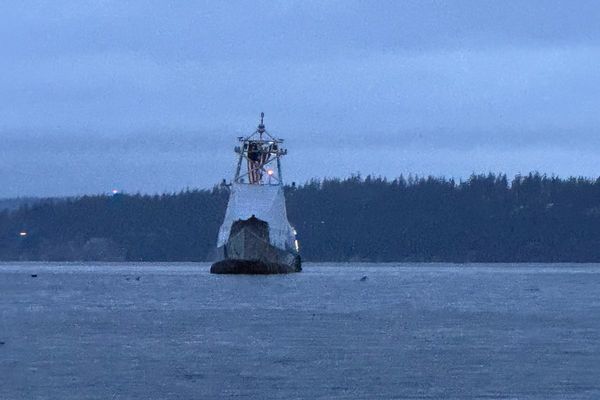Bruce E. Toll, co-founder in 1967 of Fortune 500 homebuilder Toll Bros., has long since diversified his fortune from the Fort Washington-based firm. His firm BET Investments Inc. has bet on health care, medical, information technology and telecom companies. And in Pennsylvania he owns coal fields and auto dealers and is building hundreds of suburban apartments.
His grandfather emigrated from Ukraine in 1906. Toll says Russia's two-month-old war on that sovereign country, along with U.S. price and interest rate inflation, has changed the investing map. His answers to The Inquirer's questions have been edited for brevity and clarity.
Q: What changed this year?
A: I'm in shock over what's going on in Ukraine. I can't believe we have such a blatant war. On TV it looks like Vietnam did, when I was a kid. I never thought I'd see it in Europe.
The war in Ukraine (unavoidably) has created a lot of opportunities to start new businesses, because all the businesses in Ukraine are ruined. Volkswagen's chairman was in the news; he was saying they got a lot of parts from Ukraine, they have to find someplace else to get them.
And now Russia can't export hard coal or soft coal. Well, you know I own a large anthracite coal mine in the Tamaqua (Pennsylvania) area. Prices have escalated because of the shortage of coal.
Q: After all those campaigns against fossil fuel, demand for your coal is up?
A: Yes. Anthracite is hard coal; it is used by steel manufacturers. They are our biggest customers. And now, with the Build America infrastructure program, they'll need a lot of steel.
All those old bridges have to be widened. We have some bridges that need improvements up here in the Jenkintown (Pennsylvania) area. The state is deciding which are going to be improved now that the federal government is giving away $600 or $700 billion. Even that won't get everything done.
You know, Pennsylvania is one of the worst places for highways and bridges. So many of them haven't been touched in 50 years. I used to go down Broad Street in Philadelphia and turn on Cayuga to get on Roosevelt Boulevard, then the Schuylkill Expressway, to get into the city. Well, in 2019, they said they were closing Cayuga, to replace utilities. I called the mayor. He told me it will take four years. I told him, for the fun of it, I don't think Hoover Dam took four years.
Hundreds of Philly-area bridges are slowly deteriorating. Should travelers be worried?
So I started turning on Hunting Park Avenue. But now they've been digging up Hunting Park. So I have to go all the way down Broad Street to get into town. It seems crazy, all this to put a pipe in.
Q: Will rising interest rates slow construction?
A: Interest rates have been so low, for so long, it's been really easy to be in the real estate business. I've gotten loans on properties last year at rates I'd have said you were crazy. Two 35-year loans for less than 2.5% interest, from HUD. For multifamily developments, apartments.
When I went in business in 1968, mortgage rates were just going up to 6%, from 5.5%. We thought it was the end of the world. Compared to that, interest rates are still remarkably low.
But now inflation is coming. Rents have been increasing.
Q: Won't that cut demand for new apartments?
A: We're building a lot more apartments. We finished four or five communities in the last three years. Everything is getting leased 100%. We have no vacancies at the Promenade, that's 400 apartments up at Dreshertown and Welsh Roads, we built that a year and a half ago. You know how, in King of Prussia, they have added all those apartments near the shopping center? These apartments are right above the shopping.
We're getting ready to build more in Montgomery and Delaware and Bucks Counties. We'll open at Granite Run before the end of the year. We're building in Lower Moreland, on a piece of ground I've owned for years on Philmont Avenue. And I just bought the half of the Prudential campus I didn't already own at Welsh Road near the turnpike a couple of weeks ago.
Anybody who's built anything in the last 10 years in Montgomery County is filled up. My biggest fear is, with shipping as it is, I won't be able to get all the electronics — dishwashers and ovens, the ones I want. The lumber is there, but it's expensive.
Q: Who's moving to all these apartments?
A: A good portion of people 55 and over who decided to downsize from their house. And a lot of young married people. I'm amazed at all the young people.
People are staying in their apartments longer. A lot of young people are working from home, so we put WiFi throughout the buildings. I think some are never moving to houses.
Q: Is that by choice? Or are a lot of Americans priced out of the market, not sharing in the prosperity?
A: It is the economics. Some people don't have the down payment, even if they can afford the monthly mortgage payment. It's tougher [to get approved for a home loan] than 15 years ago, before (the Great Recession]. Which to me is a good thing. We were giving away mortgages to unqualified people [and speculative investors].
Q: You don't do much in the city of Philadelphia; why not?
A: That's true. When I was president at Toll Bros., we bought the land at 26th and Bainbridge [former Naval Home, now townhomes and apartments] from the federal government. The company, where I am no longer involved, is still doing a few buildings in Center City.
But I've mostly avoided that. I was raised in Elkins Park. Dad told me horror stories about Philadelphia government.
Q: Are the youngest Tolls attracted to business?
A: I have 11 grandchildren. One graduated from Wharton last year, one is graduating from Wharton this year, one is still at Wharton. My granddaughter who's at Wharton brought five [classmates] to Passover dinner this year, and every one of them had a job already lined up. Mostly not in Philadelphia.
You can see this is a great time to become employed. All the young people I know are having no problem getting a job, so long as they have learned something they can put to work.







